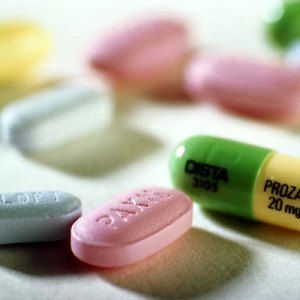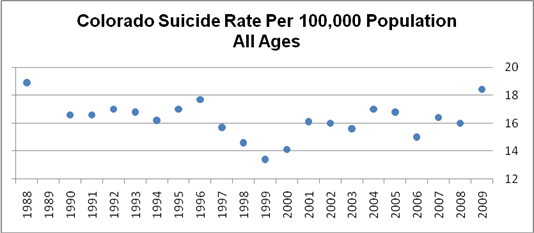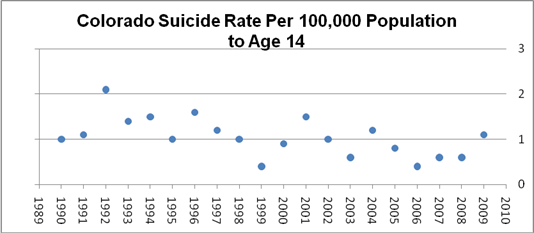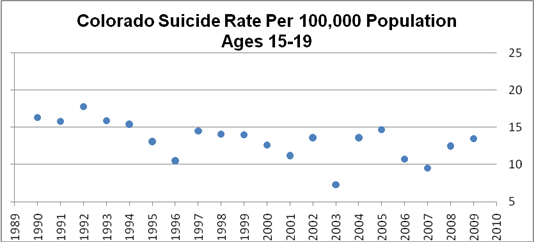The Highlands Ranch mother who recently shot and killed her two young sons before turning the gun on herself was on antidepressants, making the incident yet another stunningly tragic act of violence linked to psychiatric drugs.
Jennifer Laber had two antidepressants, desmethylvenlafaxine and bupropion, in her system when she took the lives of her sons, ages 3 and 5, and then ended her own life on November 29, according to the autopsy report released by the Douglas County Coroner’s Office.
Desmethylvenlafaxine, marketed as Pristiq among other trade names, has known side effects that include depression and suicidal thoughts and actions. Pristiq was ranked #10 on the list of the top 10 prescription drugs most linked to violence compiled by the Institute for Safe Medication Practices in 2010, after analyzing reports of drug side effects filed with the FDA.
The other antidepressant Laber was taking, bupropion, is marketed as Wellbutrin and Zyban among other trade names, and its known side effects include suicidal thoughts and attempts and thoughts of hurting or killing others.
Laber also was taking the anti-convulsant drug lamotrigine, marketed under the trade name Lamictal, which is sometimes prescribed for depression. Known side effects of Lamictal include changes in mood, aggression, depression, and suicidal thoughts and attempts.
The 38-year-old mother was prescribed all three of these drugs despite her long history of depression, which included suicidal thoughts and suicide attempts, according to the autopsy report.
Laber is not the first Colorado mother on antidepressants who killed her children.
Stephanie Rochester, a 34-year old mother in Superior, was prescribed the antidepressant Zoloft the week before she smothered her infant son in his crib in 2011.
A 38-year-old Lamar mother, Rebekah Amaya, was on antidepressants when she drowned her 6-month-old son and 4-year-old daughter in their bathtub in 2003.
To date, 160 drug regulatory agency warnings from 11 countries and 225 research studies from 31 countries have warned about antidepressants’ dangerous side effects, which include:
- suicide, suicidal thoughts, and suicidal attempts
- hostility, violence or aggression
- self-harm
- mania or psychosis
- hallucinations or delusions
- depression
- homicide and homicidal thoughts
Half of the top 10 prescription drugs most linked to violence are antidepressants, according to the 2010 study from the Institute for Safe Medication Practices.
Research Showing Antidepressants Are Neither Safe Nor Effective
Numerous research studies point to antidepressants being harmful, ineffective, and an obstacle to recovery from depression. Among the more recent studies:
- Researchers in a 2011 study published in the Journal of Psychotherapy and Psychosomatics found that antidepressants can cause chronic and deepening depression in adults and suggest that discontinuing the drugs is the solution. (See important “Warning” below on discontinuing antidepressants.)
- A 2012 report from the Associate Director of the Placebo Studies Program at Harvard Medical School, an expert who has studied the effects of placebos (pills with no drug in them, or “sugar pills”) for 36 years, has concluded that antidepressants are no more effective than sugar pills for most people – and the placebo has none of antidepressants’ dangerous side effects.
- In a 2012 research paper published in the online journal Frontiers in Psychology, a team of researchers reviewing previous studies of the effects of antidepressants concluded that, by disrupting many different processes in the body that are regulated by serotonin, antidepressants are actually doing patients more harm than good.
- In a 2015 study posted by the journal Neuroscience & Biobehavioral Reviews, researchers who reviewed prior research on antidepressants concluded the unproven theory that low levels of the brain chemical serotonin cause depression appears to be wrong, and that the best available evidence appears to show there is more serotonin in depressed individuals, not less – which actually makes antidepressants an obstacle to recovery from depression.
An epidemic of mothers killing their children – and doing so by more and more violent methods – began in the early 1990’s, according to Ann Blake Tracy, executive director of the International Coalition for Drug Awareness. “These [mothers] were often described as the very best and most caring mothers,” she notes.
What was driving these mothers to such violence? “The most common denominator was the use of an antidepressant by the mother who had killed her children,” Tracy said.
Antidepressants Are The Most Common Denominator in Mass Murders
Beyond the tragic instances of mothers taking the lives their children, antidepressants are the most frequent common denominator in other “inexplicable” acts of violence and mass murder.
At least 35 school-related acts of violence in the U.S., including at least 14 school shootings, have been committed by individuals taking or withdrawing from psychiatric drugs, especially antidepressants. (In other school shootings, information about the shooters’ psychiatric drug use was not released.)
In Colorado, shooters in the mass murders at Columbine High School and at an Aurora movie theater were driven by antidepressants.
Tracy points out that the same common denominator of antidepressants is found in other mass murders, such as the mass murders committed by the truck driver who plowed into a crowd and killed 84 people this past summer in France, the German Wings co-pilot who deliberately crashed his jet into the French Alps and killed 150 people in 2015, and the bus driver who crashed into the wall of a Swiss tunnel and killed 28 people in 2012.
Tracy, an expert who frequently testifies on the adverse effects of antidepressants, points out that antidepressant drugs are most similar in action to the hallucinogens LSD and PCP.
“Neither homicide nor suicide is an acceptable ‘side effect’ to what we are calling safe and effective ‘medications,’” she said.
Warning: Anyone wishing to discontinue an antidepressant or any other psychiatric drug is cautioned to do so only under the supervision of a competent medical doctor because of potentially dangerous withdrawal symptoms.
If you or someone you know experienced violence or suicidal thoughts or actions from taking an antidepressant or any other psychiatric drugs, please report it to the FDA by clicking here. And we want to talk to you about your experience. You can contact us by clicking here or by calling 303-789-5225. All information will be kept strictly confidential.










